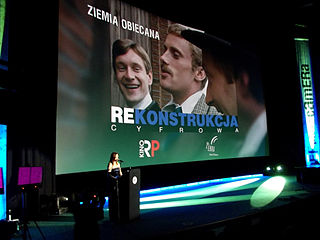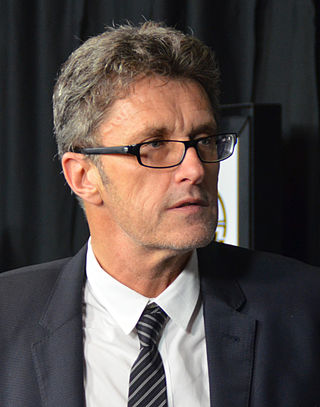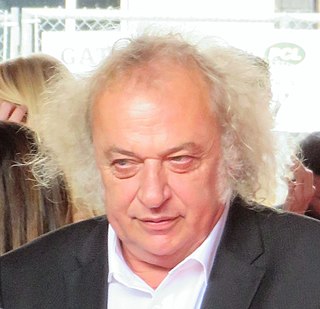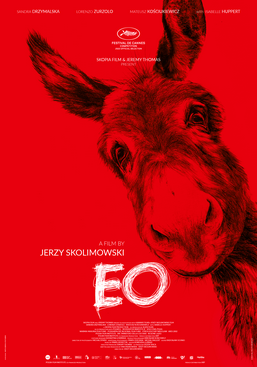Related Research Articles

The history of cinema in Poland is almost as long as the history of cinematography, and it has universally recognized achievements, even though Polish films tend to be less commercially available than films from several other European nations.

Andrzej Witold Wajda was a Polish film and theatre director. Recipient of an Honorary Oscar, the Palme d'Or, as well as Honorary Golden Lion and Honorary Golden Bear Awards, he was a prominent member of the "Polish Film School". He was known especially for his trilogy of war films consisting of A Generation (1955), Kanał (1957) and Ashes and Diamonds (1958).

Three Colours: Blue is a 1993 drama film directed and co-written by Polish filmmaker Krzysztof Kieślowski. It is the first of three films that make up the Three Colours trilogy, themed on the French Revolutionary ideals of liberty, equality, and fraternity, followed by White and Red. According to Kieślowski, the subject of the film is liberty, specifically emotional liberty, rather than its social or political meaning.

Agnieszka Holland is a Polish film and television director and screenwriter, best known for her political contributions to Polish cinema. She began her career as assistant to directors Krzysztof Zanussi and Andrzej Wajda, and emigrated to France shortly before the 1981 imposition of the martial law in Poland.

Jan Andrzej Paweł Kaczmarek is a Polish composer. He has written scores for more than 70 feature films and documentaries, including Finding Neverland (2004), for which score he won an Oscar and a National Board of Review Award. Other notable scores were for Hachi: A Dog's Tale, Unfaithful, Evening, The Visitor, and Washington Square.

Paweł Aleksander Pawlikowski is a Polish filmmaker. He garnered early praise for a string of documentaries in the 1990s and for his award-winning feature films of the 2000s, Last Resort (2000) and My Summer of Love (2004). His success continued into the 2010s with Ida (2013), which won the Academy Award for Best Foreign Language Film, and Cold War (2018), for which Pawlikowski won the Best Director prize at the Cannes Film Festival and was nominated for the Academy Award for Best Director, while the film received a nomination for Best Foreign Language Film.

Polish Film Award, or Eagle is the national film award of Poland. It has been delivered annually since 1999, with the first event held on 21 June, by the National Chamber of Audiovisual Producers (KIPA). Since 2003 they have been awarded by the Polish Film Academy.

Krystyna Jolanta Janda is a Polish film and theater actress best known internationally for playing leading roles in several films by Polish director Andrzej Wajda, including Man of Marble and Man of Iron.

The European Film Award for Best Actor is an award given out at the annual European Film Awards to recognize an actor who has delivered an outstanding leading performance in a film industry. The awards are presented by the European Film Academy (EFA) and was first presented in 1988 to Swedish actor Max von Sydow for his role as Lassefar "Lasse" Karlsson in Pelle the Conqueror.
European Film Award for Best Film is one of the annual European Film Awards, presented by the European Film Academy to recognize the best in European filmmaking. It was first awarded in 1988 with Polish film A Short Film About Killing, directed by Krzysztof Kieślowski, being the first recipient of the award.

Małgorzata Szumowska is a Polish film director, screenwriter and producer, born in Kraków.
The European Film Award for Best Cinematographer, also known as Carlo Di Palma European Cinematographer Award, is an award given to cinematographers working in the motion picture industry by the European Film Academy.

Ida is a 2013 drama film directed by Paweł Pawlikowski and written by Pawlikowski and Rebecca Lenkiewicz. Set in Poland in 1962, it follows a young woman on the verge of taking vows as a Catholic nun. Orphaned as an infant during the German occupation of World War II, she must meet her aunt, a former Communist state prosecutor and only surviving relative, who tells her that her parents were Jewish. The two women embark on a road trip into the Polish countryside to learn the fate of their relatives.
Ryszard Lenczewski is a Polish film and television cinematographer with more than thirty feature film credits. Lenczewski has been the cinematographer for four of director Paweł Pawlikowski's feature films. His work on Pawlikowski's Ida (2014) has been widely recognized, garnering nominations for both the Academy Award and the BAFTA Award.
The European Film Award for Best Supporting Actor was awarded by the European Film Academy to actors of European language films. It ran from 1988 to 1992.
The European Film Award for Best Supporting Actress was awarded by the European Film Academy to actress of European language films.

Cold War is a 2018 historical drama film directed by Paweł Pawlikowski, who co-wrote the screenplay with Janusz Głowacki and Piotr Borkowski. It is an international co-production by producers in Poland, France and the United Kingdom. Set in Poland and France during the Cold War from the late 1940s until the 1960s, the story follows a musical director who discovers a young singer, exploring their subsequent love story over the years. The film, which was loosely inspired by the lives of Pawlikowski's parents, also features Borys Szyc, Agata Kulesza, Cédric Kahn and Jeanne Balibar in supporting roles.

EO is a 2022 drama road movie directed by Jerzy Skolimowski. Inspired by Robert Bresson's 1966 film Au Hasard Balthazar, it follows the life of a donkey introduced to us while featured in a Polish circus.